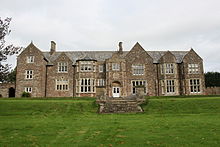
William Richard Fletcher-Vane,2nd Baron Inglewood,,usually called Richard Inglewood,is a former Conservative Party politician in the United Kingdom. Lord Inglewood is a non-affiliated member of the House of Lords,a barrister and a chartered surveyor. He was a Member of the European Parliament from 1989 to 2004,and a junior minister in the UK government from 1995 to 1997.

David Charles Waddington,Baron Waddington,was a British politician and barrister.
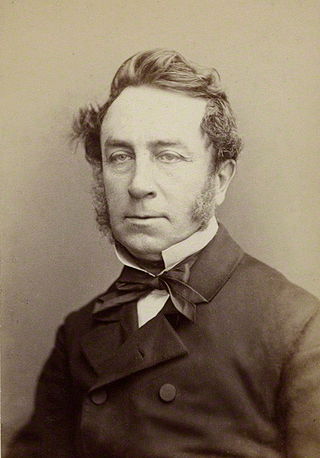
Baron O'Hagan,of Tullahogue in the County of Tyrone,is a title in the Peerage of the United Kingdom. It was created on 14 June 1870 for Sir Thomas O'Hagan,then Lord Chancellor of Ireland. His younger son,the third Baron,served as a Lord-in-waiting from 1907 to 1910 in the Liberal administrations of Sir Henry Campbell-Bannerman and H. H. Asquith and was later a Deputy Speaker of the House of Lords. In 1909 Lord O'Hagan assumed by Royal licence the additional surname of Towneley,which was that of his maternal grandfather. As of 2010 the title is held by his grandson,the fourth Baron,who succeeded in 1961. He is the son of the Hon. Thomas Anthony Edward Towneley Strachey. Lord O'Hagan was a Member of the European Parliament for Devon from 1973 to 1975 and again from 1979 to 1994,first as an independent and later as a Conservative. He assumed in 1938 by deed poll the additional Christian name of Towneley and the surname of Strachey in lieu of his patronymic. Strachey was the surname of his maternal grandfather Edward Strachey,1st Baron Strachie.

Thomas O'Hagan,1st Baron O'Hagan,KP,PC (Ire),QC,was an Irish lawyer and judge. He served as Lord Chancellor of Ireland from 1868 to 1874 and again from 1880 to 1881.

The 1994 European Parliament election was the fourth European election to be held in the United Kingdom. It was held on Thursday 9 June,though,as usual,the ballots were not counted until the evening of Sunday 12 June. The electoral system was,for the final European election,first past the post in England,Scotland and Wales and single transferable vote in Northern Ireland. This was the first election with 87 MEPs,the European Parliamentary Elections Act 1993 having increased the number of seats for the UK from 81. For the first time,the UK did not have the lowest turnout in Europe. Turnout was lower in the Netherlands and Portugal.
Strachey is a surname. Notable people with the surname include:
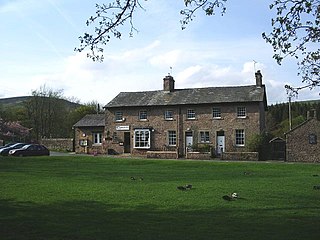
Dunsop Bridge is a village in the civil parish of Bowland Forest High,in the borough of Ribble Valley,Lancashire,England,9 miles (14 km) north-west of Clitheroe,15 miles (24 km) south-east of Lancaster and 24.5 miles (39 km) west of Skipton. Historically,the village is part of the West Riding of Yorkshire,but was placed under the administration of Lancashire County Council on 1 April 1974.

Bowland Forest Low is a civil parish in the Ribble Valley district of Lancashire,England,covering some 5,500 acres (22 km2) of the Forest of Bowland. According to the 2001 census,the parish had a population of 168,falling to 160 at the 2011 Census. The parish includes the hamlets of Whitewell and Cow Ark. From northwards clockwise,it borders the civil parishes of Newton,Bashall Eaves,Aighton,Bailey and Chaigley,Bowland-with-Leagram and Bowland Forest High. Before 1974,it formed part of Bowland Rural District in the West Riding of Yorkshire.
John Edward Tomlinson,Baron Tomlinson was a British Labour Co-operative politician. He served as a life peer in the House of Lords from 1998 until his death,and had previously been a Member of Parliament from 1974 to 1979,and a Member of the European Parliament (MEP) from 1984 to 1999.
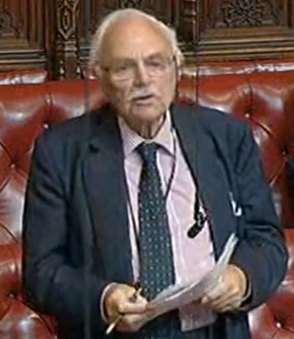
Michael Norman Shaw,Baron Shaw of Northstead,was a National Liberal and British Conservative Party politician who served as a Member of Parliament (MP) from 1960 to 1964 and from 1966 to 1992 for the Conservatives.

Roundell Cecil Palmer,3rd Earl of Selborne,CH,PC,known as "Top Wolmer" and styled Viscount Wolmer from 1895 to 1941,was a British administrator,intelligence officer and Conservative politician.

Whitewell is a village within the civil parish of Bowland Forest Low and Ribble Valley borough of Lancashire,England. It is in the Forest of Bowland Area of Outstanding Natural Beauty. Historically,the village fell just within the boundaries of the West Riding of Yorkshire. It was transferred to Lancashire for administrative purposes on 1 April 1974,under the provisions of the Local Government Act 1972. It stands above a bend in the River Hodder.
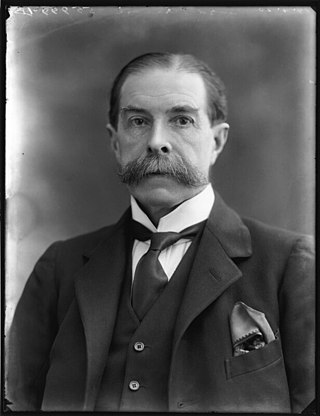
Edward Strachey,1st Baron Strachie,PC,known as Sir Edward Strachey,Bt,between 1901 and 1911,was a British Liberal politician. He was a member of the Liberal administrations of Sir Henry Campbell-Bannerman and H. H. Asquith between 1905 and 1915.

Maurice Herbert Towneley Towneley-O'Hagan,3rd Baron O'Hagan,was a British Liberal and later Conservative politician.

Christopher James Prout,Baron Kingsland was a British barrister and Conservative Party politician. He is perhaps most well known for serving as the leader of the Conservative group of Members of the European Parliament (MEPs) and his role in initiating their association with the European People's Party. He later became a noted expert on constitutional issues.
The Lordship of Bowland is a manorial lordship associated with the Forest of Bowland in Lancashire,England. The lordship fell into disuse between 1885 and 2008,during which time it was widely believed to have lapsed;it was revived in 2008.

The Honour of Clitheroe is an ancient grouping of manors and royal forests centred on Clitheroe Castle in Lancashire,England;an honour traditionally being the grant of a large landholding complex,not all of whose parts are contiguous. In the case of Clitheroe,this complex was loosely clustered around the ancient wapentake of Blackburnshire.

Thomas Towneley O'Hagan,2nd Baron O'Hagan,was a British peer and soldier.
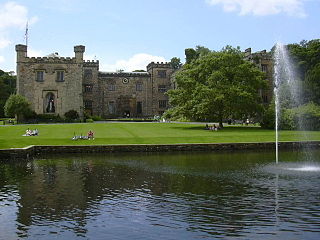
The Towneley or Townley family are an English family whose ancestry can be traced back to Anglo-Saxon England. Towneley Hall in Burnley,Lancashire,was the family seat until its sale,together with the surrounding park,to the corporation of Burnley in 1901. Towneley Hall is now a Grade I listed building and a large museum and art gallery within Towneley Park.
The 1911 South Somerset by-election was a Parliamentary by-election held on 21 November 1911. The constituency returned one Member of Parliament (MP) to the House of Commons of the United Kingdom,elected by the first past the post voting system.
